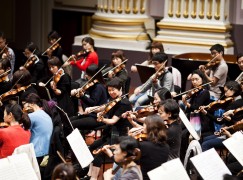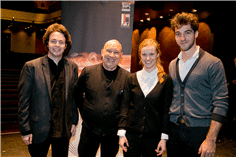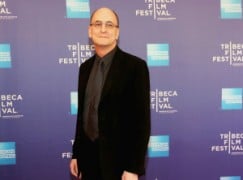We are sharing with you Mahan Esfehani’s penetrating 45-minute documentary on his instrument.
You won’t have heard much about it from BBC Radio 3.
Click here. Learn more.

We are sharing with you Mahan Esfehani’s penetrating 45-minute documentary on his instrument.
You won’t have heard much about it from BBC Radio 3.
Click here. Learn more.

The finals are next Sunday. Click here for the nine contenders. Recognise anyone?

![Smith, Reginald [1]](https://slippedisc.com/wp-content/uploads/2015/03/Smith-Reginald-1-150x180.jpg)
![Verrez, Virginie [1]](https://slippedisc.com/wp-content/uploads/2015/03/Verrez-Virginie-1-150x180.jpg)
Legends who got their start at these auditions include Renée Fleming, Susan Graham, Thomas Hampson, Eric Owens, Deborah Voigt and Frederica von Stade
Who’ll be the first presenter to pronounce this composer’s name? It’s a new Coro release.

Not sure what point they’re making.

It’s the work of a Norwegian composer, Sverre Indris Joner.
As if things weren’t bad enough at the Seoul Philharmonic, which got its US tour cancelled by the city council ast week, the city’s other orchestra is locked in all-out industrial war.
The KBS Symphony Orchestra, formerly run by the broadcasting authority, has been hived off to a new company. Two thirds of the players – 67 altogether – are refusing to sign contracts with the new owner until job security is guaranteed. The owners have no intention of doing so.
Today, they advertised vacancies on 16 different instruments in the orchestra, paving the way for mass dismissals.
Seoul has, in a matter of weeks, gone from a booming classical economy to near-bust.
What is remarkable is how little the managements – or their sponsors Hyundai, and others – seem concerned by their worldwide loss of face.

We haven’t heard from them in a while. It has been months since the last Lang Lang release, likewise Jonas Kaufmann.
No Sony adverts are appearing in any recording media.
The label’s US website lists just two releases for 2015, by 2Cellos and Simone Dinnerstein.
The German site has Sonya Yoncheva and three instrumentalists in February, nothing at all in March.
This was the label that was designed to ‘dominate’ classical music.
So what’s happened?

The UK had contenders in the final three spots of the Nestlé-Salzburg Conductors Award in each of the past three years, with Ben Gernon winning outright in 2013 and Jamie Phillips coming second the year before. But 2015 is a Brit-free year in Salzburg.
The finalists, chosen by Dennis Russell Davies (pictured) and Plácido Domingo, are:
Jiri Rozen (23), Czech Republic
Giedrė Šlekytė (25), Lithuania
Lorenzo Viotti (25), Switzerland

Maria Maksakova, a popular soprano in Gergiev’s Mariinsky, will marry Communist Party of Russia MP Denis Voronenkov, in Moscow on March 27. Maksakova, 37, was herself elected to the Duma in 2011, representing Vladimir Putin’s United Russia party.

Vast theories are being built on a piece of neuro-research at the University of Helsinki, including a claim in the Dail Mail that listening to classical music can avert Alzheimer’s Disease.
The exact findings are actually more interesting. Control groups were exposed to Mozart’s 3rd violin concerto, K216. Scientistis found that ‘listening to music enhanced the activity of genes involved in dopamine secretion and transport, synaptic function, learning and memory. One of the most up-regulated genes, synuclein-alpha (SNCA) is a known risk gene for Parkinson’s disease that is located in the strongest linkage region of musical aptitude.‘
But before you jump to any Mail-like conclusions: ‘The effect was only detectable in musically experienced participants, suggesting the importance of familiarity and experience in mediating music-induced effects.’
In other words, listening to music intently all your life might help improve brain function at a point of degeneration.
Now, that could be very good news.
Full press release below.

Although listening to music is common in all societies, the biological determinants of listening to music are largely unknown. According to a latest study, listening to classical music enhanced the activity of genes involved in dopamine secretion and transport, synaptic neurotransmission, learning and memory, and down-regulated the genes mediating neurodegeneration. Several of the up-regulated genes were known to be responsible for song learning and singing in songbirds, suggesting a common evolutionary background of sound perception across species.
Listening to music represents a complex cognitive function of the human brain, which is known to induce several neuronal and physiological changes. However, the molecular background underlying the effects of listening to music is largely unknown. A Finnish study group has investigated how listening to classical music affected the gene expression profiles of both musically experienced and inexperienced participants. All the participants listened to W.A. Mozart’s violin concert Nr 3, G-major, K.216 that lasts 20 minutes.
Listening to music enhanced the activity of genes involved in dopamine secretion and transport, synaptic function, learning and memory. One of the most up-regulated genes, synuclein-alpha (SNCA) is a known risk gene for Parkinson’s disease that is located in the strongest linkage region of musical aptitude. SNCA is also known to contribute to song learning in songbirds.
“The up-regulation of several genes that are known to be responsible for song learning and singing in songbirds suggest a shared evolutionary background of sound perception between vocalizing birds and humans”, says Dr. Irma Järvelä, the leader of the study.
In contrast, listening to music down-regulated genes that are associated with neurodegeneration, referring to a neuroprotective role of music.
“The effect was only detectable in musically experienced participants, suggesting the importance of familiarity and experience in mediating music-induced effects”, researchers remark.
The findings give new information about the molecular genetic background of music perception and evolution, and may give further insights about the molecular mechanisms underlying music therapy.
###
The responsible researcher of the study is MSc (bioinformatics) Chakravarthi Kanduri from the University of Helsinki. The study protocol was designed by MuD Pirre Raijas and associate professor Irma Järvelä, University of Helsinki, with the help of Professor Harri Lähdesmäki, Aalto University. The Academy of Finland and the Biomedicum Helsinki Foundation have financed the study.
The quote above is from one of several resignation letters by board members of the Metropolitan Opera, published in an exhaustive article on the Met’s troubles by James B. Stewart in the New Yorker. Read the full article here.
The article, by a business journalist who knows his numbers, is familiar with the ways of extreme wealth and is a regular Met-goer, had been anticipated with great anxiety at Fortress Gelb. In the event, it earns more sympathy for Gelb than for anyone else in the organisation – as a lone ranger, committed to a strategic plan and confronted with abrasive, self-gratifying, plutocratic egotists who occupy his boardroom.
In an early paragraph, Stewart overstates Gelb’s achievements prior to the Met: He took the Boston Symphony to China after the Cultural Revolution (actually, credit for arranging the tout belonged to Seiji Ozawa and the BSO management, not its publicist), arranged Vladimir Horowitz’s widely publicized return to the former Soviet Union (he assisted but did not initiate the visit), and, as president of Sony Classical, produced a series of film soundtracks and crossover hits (the soundtracks were imposed on him and few of his crossover titles were hits).

Stewart presents Gelb’s past without much fact checking. However, once inside the boardroom he lays bare the complexity of his job:
At the top of the board’s pyramid were the eleven members of the executive committee, who include Ann Ziff, the chairman; Mercedes T. Bass, the vice-chairman; Morris, the chairman of the executive committee; and Kevin W. Kennedy, the president and chief executive officer.
There are forty-three voting members, known as managing directors, followed by nine honorary directors, who attend meetings but don’t vote; forty-nine advisory directors; thirty-three members (directors); and twenty-one young associate directors—a hundred and fifty-five people in all.
That’s unmanageable. It is also irreconcilable. This is a board structure that cannot readily reach agreement on anything. Gelb’s survival over nine years is founded in part on his own jungle skills but mostly on his board’s sclerotic structure.
This bodes ill for the Met. Stewart demonstrates that the company is way behind all financial targets for the present season. The next crisis is just around the corner. The Met needs to look urgently at how it is run, not just at who is running it.
